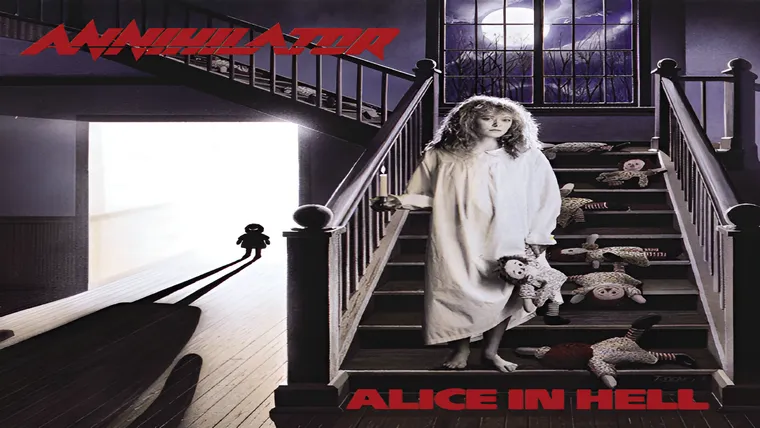
Released on April 17, 1989, Alice in Hell marked Annihilator’s explosive debut and firmly established the Canadian outfit as a force to be reckoned with in the thrash metal world. At a time when the genre was being dominated by American and European giants, Annihilator carved out their own path with a sound that fused razor-sharp technicality, breakneck speed, and a twisted sense of melody that made Alice in Hell stand apart from the crowd. With guitarist and mastermind Jeff Waters leading the charge, the band unleashed an album that was equal parts menacing, complex, and utterly infectious.
Where many debut albums show promise but lack polish, Alice in Hell hit with the confidence of a band already at the top of their game. It took the frantic energy of classic thrash and injected it with a level of precision and creativity that was well ahead of its time. From the haunting intro of “Crystal Ann” to the final moments of “Human Insecticide,” Annihilator delivered a relentless showcase of riff-driven fury and dark, theatrical storytelling.
A Twisted Wonderland: Darkness Meets Technicality
With Alice in Hell, Annihilator didn’t just want to play fast—they wanted to make you feel uncomfortable, excited, and completely consumed by their eerie sonic world. Jeff Waters’ guitar work is the album’s backbone, delivering complex, classically influenced riffs that never sacrifice aggression for flash. Songs like “Alison Hell” and “W.T.Y.D.” (Welcome to Your Death) are filled with wild tempo shifts, harmonized solos, and palm-muted riffs that hit with surgical precision.
Randy Rampage’s vocal performance adds another layer of intensity, alternating between unhinged shrieks and gritty snarls that perfectly complement the album’s nightmarish themes. His delivery is theatrical without ever becoming cartoonish, helping to drive home the unsettling narratives that run throughout the record.
“People thought we were weird for writing about madness, possession, and childhood trauma,” Waters once said. “But that was the point—we wanted to make music that scared you a little.”
And they did. Songs like “Ligeia” and the title track, Alice in Hell, are as creepy as they are catchy, drawing inspiration from Edgar Allan Poe and horror films while wrapping it all in a tightly coiled thrash package.
Precision in the Pit: Thrash with a Brain
One of the standout qualities of Alice in Hell is its balance between musical prowess and headbanging intensity. Jeff Waters’ guitar playing is nothing short of virtuosic, but it never feels self-indulgent. Every riff, solo, and harmony serves the song. Tracks like “Burns Like a Buzzsaw Blade” and “Schizos (Are Never Alone)” showcase his knack for technical, almost progressive arrangements that still pack a vicious punch.
Meanwhile, drummer Ray Hartmann keeps everything grounded with a dynamic performance that effortlessly shifts from blistering thrash beats to tight groove sections, giving the album a unique ebb and flow. The rhythm section, paired with Waters’ fretwork, creates a controlled chaos that few bands could replicate at the time.
“Jeff was always obsessed with being tight—like, machine-tight,” Rampage said in an interview. “We’d spend hours locking everything down until it was bulletproof.”
This meticulous approach paid off. Even decades later, the album still sounds razor-sharp, a testament to Waters' vision and dedication to craft.
Thrash with a Twist: Theatrical but Brutal
Though Alice in Hell fits comfortably within the thrash metal realm, it brings a distinct theatrical edge that sets it apart. The songwriting is narrative-driven and filled with eerie atmospheres that evoke classic horror and psychological tension. Whether it's the unsettling whispers in “Alison Hell” or the schizophrenic duality of “Schizos,” the album plays like a metal opera of madness and mayhem.
There’s also a strong melodic sensibility throughout the album that makes even the most aggressive songs strangely catchy. Annihilator wasn’t afraid to incorporate clean guitar passages, harmonized leads, or unusual time signatures—elements that would influence future progressive and technical thrash bands.
“We wanted it to feel like a roller coaster,” Waters said. “Scary, fast, a little off the rails—but with a purpose.”
A Thrash Classic: Innovative and Unforgettable
While Annihilator would go on to release many more albums, Alice in Hell remains their magnum opus—a near-perfect blend of aggression, technicality, and theatrical storytelling. It set the tone not just for the band’s career, but for a whole wave of bands who sought to push thrash beyond its traditional boundaries.
Its legacy continues to grow, and for good reason: Alice in Hell is one of the most creative and technically brilliant thrash albums of the late ‘80s, a time when the genre was at its peak. Yet even among giants, Annihilator stood out as something different, something darker.
Final Verdict: 9/10
Standout Tracks:
- Alison Hell
- W.T.Y.D.
- Burns Like a Buzzsaw Blade
- Schizos (Are Never Alone)
- Ligeia
For fans of technical thrash with a sinister edge, Alice in Hell is essential listening.
It's an album that doesn't just thrash—it thinks, it creeps, and it kills. Whether you're diving into the roots of progressive thrash or just looking for a record that still rips with deadly precision, Alice in Hell remains a landmark release that proves madness and metal are a match made in hell.
Until next time, play it loud, friends

